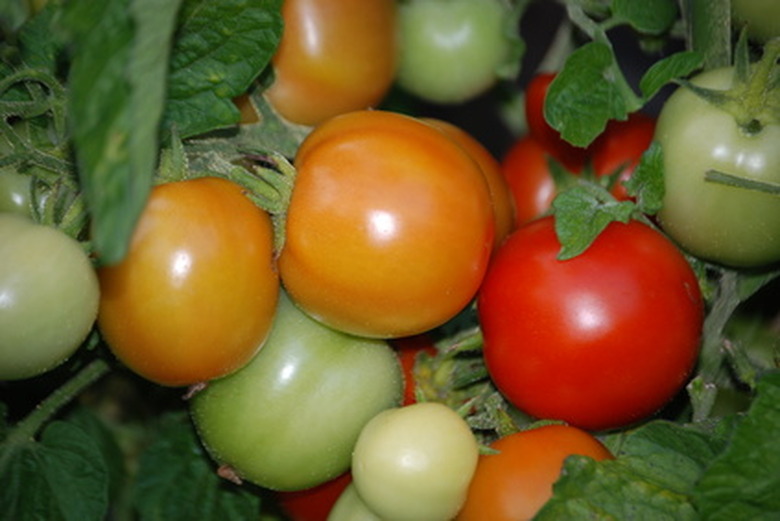Natural Ways To Keep Bugs Off Of Tomato Plants
Caterpillars, aphids, beetles and various other insects often attack a tomato plant's foliage and fruit. Don't resort to toxic chemicals to kill such pests. There are several natural and low-toxic methods of deterring and killings bugs on your tomato plants.
Keep Tomato Plants Healthy
A healthy tomato plant that's properly watered and fed is less susceptible to both insect pests and diseases, according to "American Tomato" by Robert Hendrickson. Fertilize the plant at planting and again when it begins producing flowers. Ohio State University recommends 3 lbs. of standard vegetable garden fertilizer, such as a 5-20-20 or 5-10-10 product for every 100 square feet of garden soil. Apply water once or twice a day, giving each plant 32 oz. of water daily.
- Caterpillars, aphids, beetles and various other insects often attack a tomato plant's foliage and fruit.
- A healthy tomato plant that's properly watered and fed is less susceptible to both insect pests and diseases, according to "American Tomato" by Robert Hendrickson.
Mulch
Mulch has several benefits. First, it helps conserve soil moisture. Second, it slowly disintegrates and adds micronutrients to the soil, which feed the tomato plant's roots for a healthier and more pest- and disease-resistant plant. Finally, it blocks out weeds. Weeds commonly host insect pests, and keeping them at bay may significantly lower the amount of potential pests you have in your garden. Apply 3 to 4 inches of mulch around the base of each tomato plant. Mulching materials include wood chips, shredded leaves and grass clippings.
- Mulch has several benefits.
- Second, it slowly disintegrates and adds micronutrients to the soil, which feed the tomato plant's roots for a healthier and more pest- and disease-resistant plant.
Companion Planting
Some plants have natural insect-repelling properties. Companion planting–the practice of growing repellent plants near pest-susceptible plants–can be a powerful way to ward off bugs, according to Cornell University. The university recommends growing basil near tomatoes to keep away the tomato hornworm, a common and destructive tomato pest. Thyme and lavender, grown in a circle around your tomatoes, can keep out slugs. Additional plants that have general insect-repelling scents include chives, parsley and dill.
Horticultural Oils
Natural insecticides formulated from horticultural oils kill insect pests by either suffocating them or poisoning them, depending on the specific oil used. Such sprays are effective against common tomato pests like caterpillars and aphids, as well as some tomato diseases like powdery mildew, according to Colorado State University. Neem oil is one of the most popular horitcultural oils and can be purchased from most garden soils. Apply horticultural oils just like you would any standard insecticide spray, misting it onto the tomato plant wherever problems exist.
- Some plants have natural insect-repelling properties.
- Such sprays are effective against common tomato pests like caterpillars and aphids, as well as some tomato diseases like powdery mildew, according to Colorado State University.
Manual Removal
Manual removal can effectively counter some larger tomato pests, such as caterpillars and beetles. Pluck the insects off by hand. Alternatively, place a bucket of soapy water under the tomato plant and shake the plant vigorously to dislodge any insects into the soapy water. This method is ideal for younger plants that have yet to produce fruit, as shaking can cause the fruit to fall off.
Sulfur Dusts
Sulfer dust, sold in most garden stores and nurseries, offers a toxic but organic and all-natural method of killing most garden insects, according to Oklahoma State University. The sulfur is dusted onto the tomato plant's foliage where it kills bugs on contact and, if it doesn't rain, has a persistent residual effect.
References
- "American Tomato: The Complete Guide to Growing and Using Tomatoes"; Robert Hendrickson; 2006
- "The Organic Gardener's Handbook of Natural Insect and Disease Control: A Complete Problem-Solving Guide"; Barbara Ellis and Fern Bradley; 1996
- Ohio State University: Growing Tomatoes in the Home Garden
